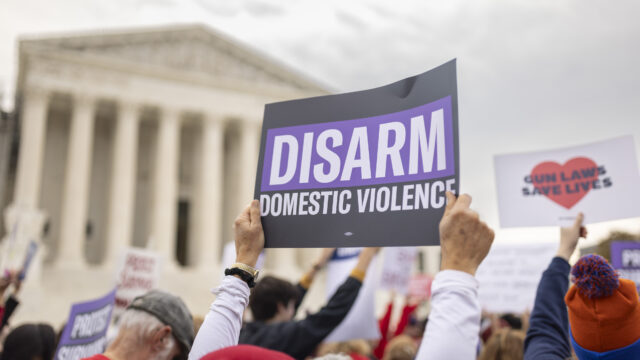Require Prohibited People to Turn in Their Guns
Require Prohibited People to Turn in Their Guns
What does this solve?
Requiring people to turn in their guns when they become legally prohibited from having them helps keep guns out of the wrong hands. Under federal law, there is no affirmative requirement that people who are prohibited from having guns turn in firearms that they already have.
This makes it easy for felons, domestic abusers, and other people who would otherwise fail a background check to keep their guns. Ensuring that firearms do not remain in the hands of those who are legally prohibited from having them helps enforce our laws that prohibit people with dangerous histories from being armed.
How it Works
Keep guns out of the wrong hands.
Requiring people prohibited from having guns to turn in the guns they already own simply enforces existing laws. Federal and state laws already provide that certain categories of people, for example, felons and domestic abusers, cannot have firearms.118 U.S.C. § 922(g) Background checks are essential to making sure these people cannot buy new guns. But it is equally important to make sure that they cannot hold onto the guns they already have.
Although federal law prohibits several categories of people with dangerous histories from having firearms,218 U.S.C. § 922(g) it does not affirmatively require firearms to be turned in once a person becomes prohibited nor does it set forth a process for them to do so. It is up to the states to make sure that prohibited people actually turn in their guns. The process typically involves state and local courts and law enforcement.
A strong relinquishment law includes a swift timeline and requires a prohibited person to turn in their gun(s) to law enforcement or a licensed firearms dealer. It also allows law enforcement to seek a warrant and seize firearms that are not promptly turned in and requires any purchase or carry permits to be turned in. Technological infrastructure to identify gun owners in real-time as they are convicted or otherwise become prohibited and funding for personnel to remove guns if they are not turned in voluntarily are also essential for successful gun removal programs.
By the numbers
14–16%
State laws that require people under domestic violence-related restraining orders to turn in their firearms are associated with a 14 to 16 percent lower intimate partner firearm homicide rate.
>23,000 guns
California authorities removed over 23,000 guns from prohibited people between 2014 and 2021.
173,000
There are an estimated 173,000 gun owners in the US who become prohibited each year.
>10,000 guns
From January 2019 to September 2021, authorities in Illinois conducted more than 450 firearms enforcement actions, covering more than 1,300 prohibited persons and more than 10,000 illegal firearms.
Which states require prohibited domestic abusers to turn in any guns after a conviction?
17 states have adopted this policy
Relinquishment for Convicted Domestic Abusers
Alabama has not adopted this policy
Relinquishment for Convicted Domestic Abusers
Alaska has not adopted this policy
Relinquishment for Convicted Domestic Abusers
Arizona has not adopted this policy
Relinquishment for Convicted Domestic Abusers
Arkansas has not adopted this policy
Relinquishment for Convicted Domestic Abusers
California has adopted this policy
- Does the state bar the surrender of firearms to third parties?
- Yes
Relinquishment for Convicted Domestic Abusers
Colorado has adopted this policy
- Does the state bar the surrender of firearms to third parties?
- No
Relinquishment for Convicted Domestic Abusers
Connecticut has adopted this policy
- Does the state bar the surrender of firearms to third parties?
- No
Relinquishment for Convicted Domestic Abusers
Delaware has not adopted this policy
Relinquishment for Convicted Domestic Abusers
Florida has not adopted this policy
Relinquishment for Convicted Domestic Abusers
Georgia has not adopted this policy
Relinquishment for Convicted Domestic Abusers
Hawaii has adopted this policy
- Does the state bar the surrender of firearms to third parties?
- No
Relinquishment for Convicted Domestic Abusers
Idaho has not adopted this policy
Relinquishment for Convicted Domestic Abusers
Illinois has adopted this policy
- Does the state bar the surrender of firearms to third parties?
- No
Relinquishment for Convicted Domestic Abusers
Indiana has not adopted this policy
Relinquishment for Convicted Domestic Abusers
Iowa has adopted this policy
- Does the state bar the surrender of firearms to third parties?
- No
Relinquishment for Convicted Domestic Abusers
Kansas has not adopted this policy
Relinquishment for Convicted Domestic Abusers
Kentucky has not adopted this policy
Relinquishment for Convicted Domestic Abusers
Louisiana has adopted this policy
- Does the state bar the surrender of firearms to third parties?
- No
Relinquishment for Convicted Domestic Abusers
Maine has not adopted this policy
Relinquishment for Convicted Domestic Abusers
Maryland has adopted this policy
- Does the state bar the surrender of firearms to third parties?
- Yes
Relinquishment for Convicted Domestic Abusers
Massachusetts has adopted this policy
- Does the state bar the surrender of firearms to third parties?
- Yes
Relinquishment for Convicted Domestic Abusers
Michigan has not adopted this policy
Relinquishment for Convicted Domestic Abusers
Minnesota has adopted this policy
- Does the state bar the surrender of firearms to third parties?
- No
Relinquishment for Convicted Domestic Abusers
Mississippi has not adopted this policy
Relinquishment for Convicted Domestic Abusers
Missouri has not adopted this policy
Relinquishment for Convicted Domestic Abusers
Montana has not adopted this policy
Relinquishment for Convicted Domestic Abusers
Nebraska has not adopted this policy
Relinquishment for Convicted Domestic Abusers
Nevada has adopted this policy
- Does the state bar the surrender of firearms to third parties?
- No
Relinquishment for Convicted Domestic Abusers
New Hampshire has not adopted this policy
Relinquishment for Convicted Domestic Abusers
New Jersey has adopted this policy
- Does the state bar the surrender of firearms to third parties?
- Yes
Relinquishment for Convicted Domestic Abusers
New Mexico has not adopted this policy
Relinquishment for Convicted Domestic Abusers
New York has adopted this policy
- Does the state bar the surrender of firearms to third parties?
- Yes
Relinquishment for Convicted Domestic Abusers
North Carolina has not adopted this policy
Relinquishment for Convicted Domestic Abusers
North Dakota has not adopted this policy
Relinquishment for Convicted Domestic Abusers
Ohio has not adopted this policy
Relinquishment for Convicted Domestic Abusers
Oklahoma has not adopted this policy
Relinquishment for Convicted Domestic Abusers
Oregon has adopted this policy
- Does the state bar the surrender of firearms to third parties?
- No
Relinquishment for Convicted Domestic Abusers
Pennsylvania has adopted this policy
- Does the state bar the surrender of firearms to third parties?
- Yes
Relinquishment for Convicted Domestic Abusers
Rhode Island has adopted this policy
- Does the state bar the surrender of firearms to third parties?
- Yes
Relinquishment for Convicted Domestic Abusers
South Carolina has not adopted this policy
Relinquishment for Convicted Domestic Abusers
South Dakota has not adopted this policy
Relinquishment for Convicted Domestic Abusers
Tennessee has adopted this policy
- Does the state bar the surrender of firearms to third parties?
- No
Relinquishment for Convicted Domestic Abusers
Texas has not adopted this policy
Relinquishment for Convicted Domestic Abusers
Utah has not adopted this policy
Relinquishment for Convicted Domestic Abusers
Vermont has not adopted this policy
Relinquishment for Convicted Domestic Abusers
Virginia has not adopted this policy
Relinquishment for Convicted Domestic Abusers
Washington has not adopted this policy
Relinquishment for Convicted Domestic Abusers
West Virginia has not adopted this policy
Relinquishment for Convicted Domestic Abusers
Wisconsin has not adopted this policy
Relinquishment for Convicted Domestic Abusers
Wyoming has not adopted this policy
Which states require prohibited domestic abusers to turn in any guns while under a restraining order?
22 states have adopted this policy
Relinquishment for Domestic Abusers Under Restraining Orders
Alabama has not adopted this policy
Relinquishment for Domestic Abusers Under Restraining Orders
Alaska has not adopted this policy
Relinquishment for Domestic Abusers Under Restraining Orders
Arizona has not adopted this policy
Relinquishment for Domestic Abusers Under Restraining Orders
Arkansas has not adopted this policy
Relinquishment for Domestic Abusers Under Restraining Orders
California has adopted this policy
- Does the state bar the surrender of firearms to third parties?
- Yes
Relinquishment for Domestic Abusers Under Restraining Orders
Colorado has adopted this policy
- Does the state bar the surrender of firearms to third parties?
- No
Relinquishment for Domestic Abusers Under Restraining Orders
Connecticut has adopted this policy
- Does the state bar the surrender of firearms to third parties?
- Yes
Relinquishment for Domestic Abusers Under Restraining Orders
Delaware has not adopted this policy
Relinquishment for Domestic Abusers Under Restraining Orders
Florida has not adopted this policy
Relinquishment for Domestic Abusers Under Restraining Orders
Georgia has not adopted this policy
Relinquishment for Domestic Abusers Under Restraining Orders
Hawaii has adopted this policy
- Does the state bar the surrender of firearms to third parties?
- Yes
Relinquishment for Domestic Abusers Under Restraining Orders
Idaho has not adopted this policy
Relinquishment for Domestic Abusers Under Restraining Orders
Illinois has adopted this policy
- Does the state bar the surrender of firearms to third parties?
- No
Relinquishment for Domestic Abusers Under Restraining Orders
Indiana has not adopted this policy
Relinquishment for Domestic Abusers Under Restraining Orders
Iowa has adopted this policy
- Does the state bar the surrender of firearms to third parties?
- No
Relinquishment for Domestic Abusers Under Restraining Orders
Kansas has not adopted this policy
Relinquishment for Domestic Abusers Under Restraining Orders
Kentucky has not adopted this policy
Relinquishment for Domestic Abusers Under Restraining Orders
Louisiana has adopted this policy
- Does the state bar the surrender of firearms to third parties?
- No
Relinquishment for Domestic Abusers Under Restraining Orders
Maine has not adopted this policy
Relinquishment for Domestic Abusers Under Restraining Orders
Maryland has adopted this policy
- Does the state bar the surrender of firearms to third parties?
- Yes
Relinquishment for Domestic Abusers Under Restraining Orders
Massachusetts has adopted this policy
- Does the state bar the surrender of firearms to third parties?
- Yes
Relinquishment for Domestic Abusers Under Restraining Orders
Michigan has not adopted this policy
Relinquishment for Domestic Abusers Under Restraining Orders
Minnesota has adopted this policy
- Does the state bar the surrender of firearms to third parties?
- No
Relinquishment for Domestic Abusers Under Restraining Orders
Mississippi has not adopted this policy
Relinquishment for Domestic Abusers Under Restraining Orders
Missouri has not adopted this policy
Relinquishment for Domestic Abusers Under Restraining Orders
Montana has not adopted this policy
Relinquishment for Domestic Abusers Under Restraining Orders
Nebraska has not adopted this policy
Relinquishment for Domestic Abusers Under Restraining Orders
Nevada has not adopted this policy
Relinquishment for Domestic Abusers Under Restraining Orders
New Hampshire has adopted this policy
- Does the state bar the surrender of firearms to third parties?
- Yes
Relinquishment for Domestic Abusers Under Restraining Orders
New Jersey has adopted this policy
- Does the state bar the surrender of firearms to third parties?
- Yes
Relinquishment for Domestic Abusers Under Restraining Orders
New Mexico has adopted this policy
- Does the state bar the surrender of firearms to third parties?
- Yes
Relinquishment for Domestic Abusers Under Restraining Orders
New York has adopted this policy
- Does the state bar the surrender of firearms to third parties?
- Yes
Relinquishment for Domestic Abusers Under Restraining Orders
North Carolina has adopted this policy
- Does the state bar the surrender of firearms to third parties?
- Yes
Relinquishment for Domestic Abusers Under Restraining Orders
North Dakota has not adopted this policy
Relinquishment for Domestic Abusers Under Restraining Orders
Ohio has not adopted this policy
Relinquishment for Domestic Abusers Under Restraining Orders
Oklahoma has not adopted this policy
Relinquishment for Domestic Abusers Under Restraining Orders
Oregon has adopted this policy
- Does the state bar the surrender of firearms to third parties?
- No
Relinquishment for Domestic Abusers Under Restraining Orders
Pennsylvania has adopted this policy
- Does the state bar the surrender of firearms to third parties?
- No
Relinquishment for Domestic Abusers Under Restraining Orders
Rhode Island has adopted this policy
- Does the state bar the surrender of firearms to third parties?
- Yes
Relinquishment for Domestic Abusers Under Restraining Orders
South Carolina has not adopted this policy
Relinquishment for Domestic Abusers Under Restraining Orders
South Dakota has not adopted this policy
Relinquishment for Domestic Abusers Under Restraining Orders
Tennessee has adopted this policy
- Does the state bar the surrender of firearms to third parties?
- No
Relinquishment for Domestic Abusers Under Restraining Orders
Texas has not adopted this policy
Relinquishment for Domestic Abusers Under Restraining Orders
Utah has not adopted this policy
Relinquishment for Domestic Abusers Under Restraining Orders
Vermont has not adopted this policy
Relinquishment for Domestic Abusers Under Restraining Orders
Virginia has adopted this policy
- Does the state bar the surrender of firearms to third parties?
- No
Relinquishment for Domestic Abusers Under Restraining Orders
Washington has adopted this policy
- Does the state bar the surrender of firearms to third parties?
- Yes
Relinquishment for Domestic Abusers Under Restraining Orders
West Virginia has not adopted this policy
Relinquishment for Domestic Abusers Under Restraining Orders
Wisconsin has adopted this policy
- Does the state bar the surrender of firearms to third parties?
- No
Relinquishment for Domestic Abusers Under Restraining Orders
Wyoming has not adopted this policy
Myth & Fact
Myth
Relinquishment laws are just an elaborate way for the government to confiscate guns.
Fact
Relinquishment laws simply enforce existing laws that prohibit certain categories of people with dangerous histories from having guns. If a person is subsequently allowed to have guns again—for example, because they are no longer under a prohibiting restraining order—they can get back the guns they turned in.
Featured Resources

At the Forefront of Gun Safety: Removing Illegal Guns
While gun violence continues to spike across the country, illegal gun removal programs provide real hope about progress on new solutions.

Domestic Violence and Firearm Surrender in Rhode Island
Since the law was enacted, there has been a seven-fold increase in the number of domestic abusers who were ordered to surrender their guns.

Update Background Check Laws
Updating federal and state laws to require background checks on all gun sales is a common-sense way to keep guns out of the wrong hands.

Guns and Violence Against Women: America’s Uniquely Lethal Intimate Partner Violence Problem
Laws keeping guns out of the hands of abusers are associated with lower rates of violence against women and intimate partner homicides.
All Resources
Require Prohibited People to Turn in Their Guns
All Resources
Champions at Work: Extreme Risk Protection Orders in Action
ERPO champions share their insights on how to effectively implement extreme risk laws.
Case StudyPreventing Gun Violence by Investigating Attempted Gun Purchases by Domestic Abusers
Under federal and state law, certain individuals are prohibited from buying and possessing firearms because of their history of certain criminal convictions, restraining orders, or…
Report
Ensuring Effective Implementation of Laws that Disarm Domestic Abusers
Many states have not fully implemented laws that disarm domestic abusers, leaving survivors at risk.
Report
When the Shooting Stops: The Impact of Gun Violence on Survivors in America
The trauma of gun violence doesn’t end when the shooting stops. Experiencing gun violence has a lasting impact on survivors.
Report
Cuando el tiroteo se detiene: El impacto de la violencia con armas de fuego en los sobrevivientes de los Estados Unidos
El trauma de la violencia con armas de fuego no termina cuando se detiene el tiroteo.
Report
Misogyny, Extremism, and Gun Violence
The impact of violent misogyny, combined with the unique harm of violence involving guns, makes addressing it an urgent issue.
Report
The Danger of No-Questions-Asked Gun Sales Between Strangers
These stories are examples of tragedies that could have been prevented if a background check was required when the shooter bought their gun.
Fact SheetFatal Gaps
More than ten years after the Virginia Tech shooting, progress in closing the gaps in state mental health records submissions is evident in several…
ReportDomestic Abuse Protective Orders and Firearm Access in Rhode Island
Domestic abuse affects the lives of thousands of Rhode Islanders. According to the Rhode Island Judiciary Administration, police responded to nearly 8,000 domestic abuse calls…
Report
